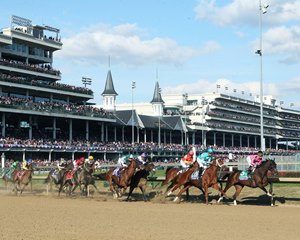Equine Safety Paramount During Derby Week


As the sporting world turns its focus to Louisville, Ky., and the May 4 Kentucky Derby Presented by Woodford Reserve (G1), host Churchill Downs is going out of its way to make sure safety issues for both equines and humans is paramount.
The perception toward horse racing has changed, and safety issues have moved to the forefront following the equine fatalities at Santa Anita Park during the winter. Management at Churchill Downs has been out in front on safety issues for some time, and Churchill Downs Inc. is a key player in the coalition of racetracks advocating for reforms on race-day medication issues that made a major announcement a few weeks ago.
In 2015, Mike Ziegler was brought on board at Churchill Downs as the executive director or racing. His previous post was as the executive director of the Safety & Integrity Alliance for the National Thoroughbred Racing Association.
"Certainly, this is a time of heightened scrutiny," said Bill Carstanjen, CEO of Churchill Downs Inc. "But these are issues Mike is focused on and our company has been focused on for a long time. It's part of the reason we created Mike's position. His position is very broad, and there are a lot of other issues to focus on. This is part of it. Society in general has reason to be much more focused on animal welfare issues. We, as a company, think that is a good thing, and it is a catalyst for further change that will improve safety of the sport for the horses and the jockeys."
New for this meet is a "chase vehicle" on the track during racing that is manned by equine ambulance personnel.
"If there is a spill on the track, the human ambulance is the first on the scene and, immediately thereafter, is the horse responders," Ziegler said. "That includes the state veterinarian of the Kentucky State Racing Commission. The driver of the truck is a former trainer, and then we have two assistant starters in the truck as well. If there is a spill, there are multiple people there who can help out and stabilize the horse.
"The initial responder is a state vet, equipped with splints and medical equipment in order to stabilize a horse to get the horse on a van. This year we have a temporary equine medical center that is going to be right next to the track kitchen where the horse can go immediately to be in a clean environment with hot and cold water and electricity and a sling in case there needs to be some sort of triage to get a horse able to get on a shuttle to get to a surgery center. So instead of going to its stall, it's going to the equine medical center."
Churchill is investing $8 million to build a permanent state-of-the-art equine medical center along with other related capital improvements on the backside. The equine medical center is slated to open in March 2020. Churchill also plans to hire an equine medical director to oversee all CDI properties. In addition to being responsible for implementing and enforcing all equine safety protocols and procedures, the position will be focused on better educating owners, trainers, and others about safety procedures.
As for the coalition with the other tracks regarding race-day medication, specifically the use of Lasix, Churchill Downs supports the elimination of the diuretic for 2-year-old horses by 2020 and in all stakes races beginning in 2021. It's a state-by-state issue at present.
"Right now, it is in each of our own individual hands to move forward through the process in our states regarding the regulatory process and work with the individual horsemen's groups to implement those reg changes," Ziegler said. "People are on the same page in respect to those changes."
Also last week, Churchill announced its intent to create an independent, national Office of Racing Integrity.
"The office of racing integrity can work collaboratively with the leading racing organizations to develop policies and also advocate," Carstanjen said. "We have a system in the United States that is really a state-by-state-driven system, so it is really important to advocate with a consistent message across jurisdictions. A lot of people will say, 'That's hard; it should be easier than that,' and from our perspective, let's just do the work.
"There's been a lot of talk, but there's clearly a mandate for action. So, for us, we announced what we were doing, but we don't constantly seek out the media to repeat it over and over again. Instead, we are putting together the pieces to go out and advocate and make sure it actually happens."
As far as coordination with some of the other players, mainly the New York Racing Association and The Stronach Group, Ziegler said: "We want to get on the other side of Derby before we starting making some other critical announcements around the office of racing integrity because we have so much to focus on this week.
"The broader message for the industry and for the country as a whole is, 'Let's go out and have a great Derby.' But as soon as we are through with this year's Derby, we are going to pick right back up and announce some processes and personnel, and some of the longer-term necessities will start to happen."
